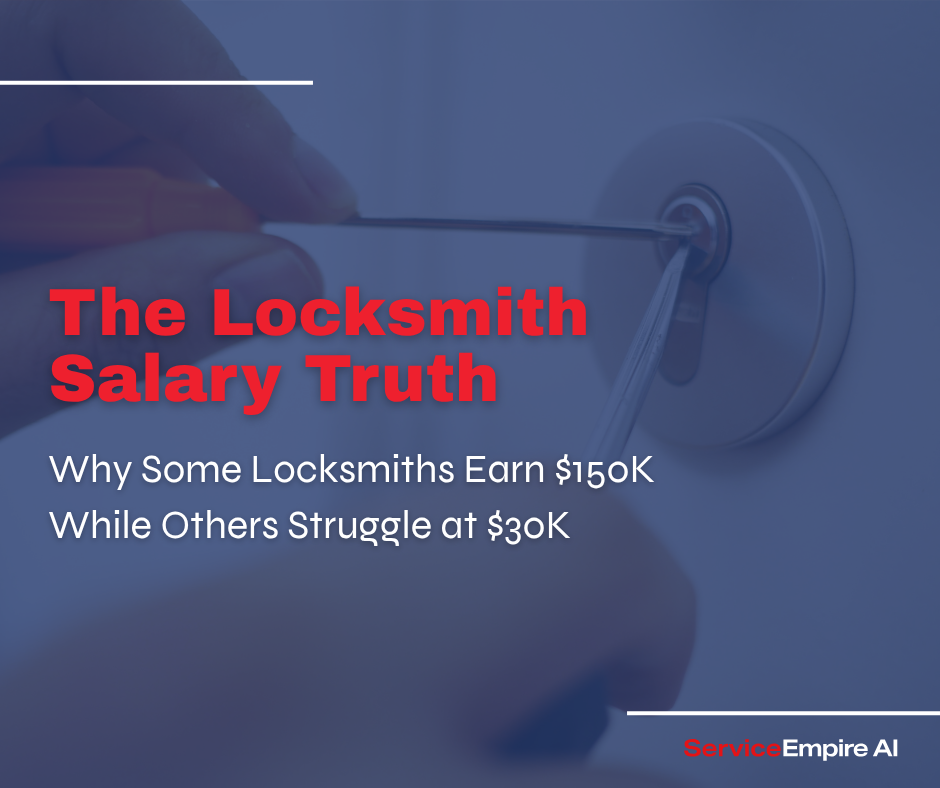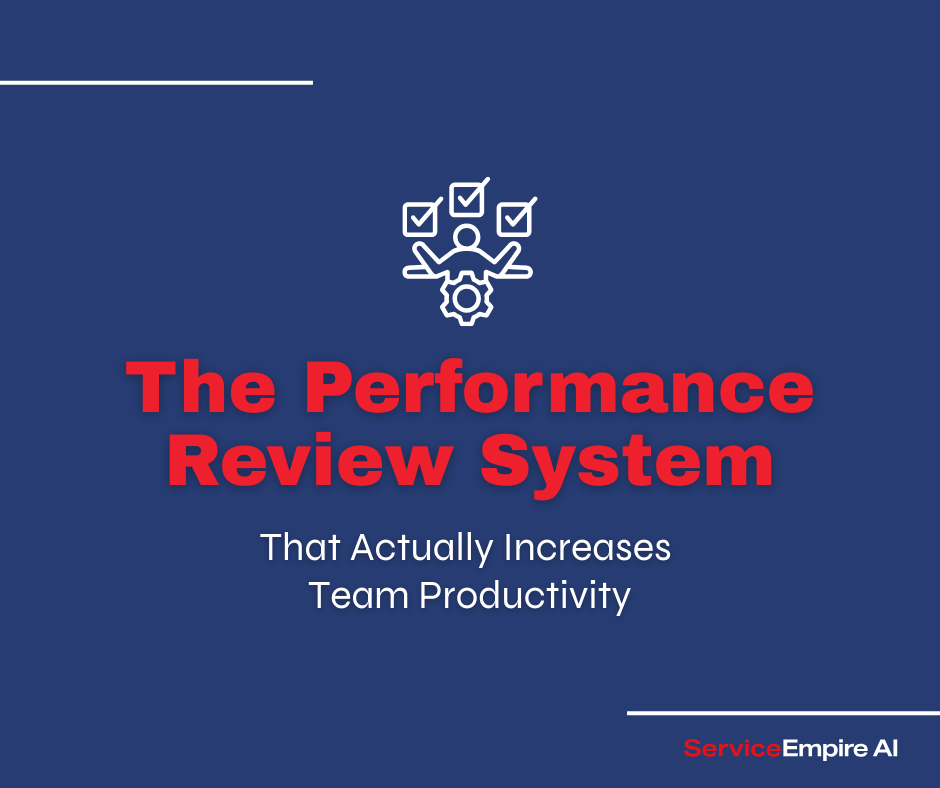
The security industry is always changing, but skilled locksmiths are still in high demand. From emergency lockouts to advanced security systems, locksmiths play a key role in keeping homes and businesses safe. If you're thinking about this career or already in it, knowing about locksmith salary ranges and how to grow your income is important.
Locksmith salary can vary a lot based on experience, location, skills, and whether you're working for a company or running your own business. New locksmiths might start around $30,000 a year, while master locksmiths or business owners in busy areas can earn $70,000 to $100,000 or more. Specialized skills often lead to higher pay.
This guide breaks down what locksmiths can expect to earn at different stages, in different places, and in different roles—giving both new and experienced locksmiths the tools to plan their careers and boost their locksmith salary.
Locksmith Career Path and Salary Progression
The locksmith profession follows a structured career progression that directly correlates with earning potential. As locksmiths advance through training and experience, their income typically increases accordingly.
Apprentice Locksmith
The entry point to the profession:
- Salary Range: $25,000-$35,000 annually
- Hourly Wage: $12-$17 per hour
- Training Requirements: Usually 3-12 months of supervised training
- Responsibilities: Basic lock servicing, key cutting, assisting journeymen
During this stage, apprentices learn fundamental skills while working under experienced locksmiths. Earnings are modest but increase with proficiency in basic techniques.
Journey-Level Locksmith
The core professional level:
- Salary Range: $35,000-$55,000 annually
- Hourly Wage: $17-$26 per hour
- Training Requirements: 1-3 years of experience, basic certifications
- Responsibilities: Independent service calls, lock installation, key systems
At this level, locksmiths handle most standard residential and commercial jobs independently. Many choose to specialize in areas like automotive or safe work at this stage.
Master Locksmith
The highest skill level for practicing locksmiths:
- Salary Range: $55,000-$85,000 annually
- Hourly Wage: $26-$40 per hour
- Training Requirements: 5+ years of experience, advanced certifications
- Responsibilities: Complex security solutions, training others, specialized work
Master locksmiths command premium rates due to their expertise with sophisticated systems, ability to solve complex security challenges, and comprehensive knowledge across multiple specialties.
Business Owner/Contractor
Independent operators or company owners:
- Salary Range: $70,000-$150,000+ annually
- Hourly Billing Rate: $75-$250 per hour (varies by service type)
- Requirements: Business license, liability insurance, often master-level skills
- Responsibilities: Business management, customer acquisition, service provision
Business owners' earnings vary dramatically based on business model, location, and marketing effectiveness.
Average Locksmith Salary by Experience Level
Experience directly correlates with earning potential in the locksmith profession, with increases at key career milestones.
Entry-Level (0-2 Years)
New locksmiths face a learning curve but can still earn a reasonable starting wage:
- Average Annual Salary: $28,500
- Salary Range: $24,000-$35,000
- 10th Percentile: $22,500
- 90th Percentile: $37,500
- Hourly Rate: $12-$17
During this phase, locksmiths build fundamental skills in key cutting, basic residential lockouts, and simple installations.
Early Career (2-5 Years)
With foundational experience, locksmiths see notable income increases:
- Average Annual Salary: $42,000
- Salary Range: $35,000-$55,000
- 10th Percentile: $32,000
- 90th Percentile: $58,000
- Hourly Rate: $17-$26
At this stage, locksmiths typically begin taking independent service calls and may start specializing in particular services.
Mid-Career (5-10 Years)
Experienced locksmiths with specialized skills command much higher pay:
- Average Annual Salary: $56,000
- Salary Range: $45,000-$72,000
- 10th Percentile: $42,000
- 90th Percentile: $75,000
- Hourly Rate: $22-$35
Mid-career professionals often hold multiple certifications and specialize in higher-paying niches like high-security systems or safe work.
Experienced (10-20 Years)
Locksmiths with extensive experience earn premium rates:
- Average Annual Salary: $68,000
- Salary Range: $55,000-$90,000
- 10th Percentile: $52,000
- 90th Percentile: $95,000
- Hourly Rate: $26-$45
These professionals often serve as shop managers, lead technicians, or successful independent contractors.
Late Career (20+ Years)
Master-level locksmiths with decades of experience reach peak earning potential:
- Average Annual Salary: $78,000
- Salary Range: $65,000-$120,000+
- 10th Percentile: $60,000
- 90th Percentile: $125,000
- Hourly Rate: $31-$60+
These veterans typically own businesses, serve as consultants, or hold senior positions with established security companies.
Locksmith Salary by State
Geographic location also impacts locksmith earnings, with variations of 30-50% between the highest and lowest-paying states.
Top 10 Highest-Paying States for Locksmiths
Some sources also cite Delaware and New Hampshire as high paying states.
Bottom 10 Lowest-Paying States for Locksmiths
Regional Patterns and Cost of Living Adjustments
When adjusted for cost of living, the highest effective locksmith salaries are found in:
- Washington
- Minnesota
- Colorado
- Texas
- Nevada
While California and New York offer high nominal salaries, their high cost of living reduces purchasing power.
Metropolitan vs. Rural Differences
Urban locksmiths typically earn 15-25% more than their rural counterparts:
- Major Metropolitan Areas: $52,000-$75,000
- Suburban Areas: $45,000-$65,000
- Rural Areas: $35,000-$50,000
However, rural locksmiths often face less competition and may build successful businesses with lower overhead costs.
Locksmith Salary by Specialization
Specializing in particular locksmith services can impact earning potential, with some niches commanding premium rates.
Residential Locksmith
The most common specialization focusing on home security:
- Average Annual Salary: $42,000
- Salary Range: $35,000-$55,000
- Key Services: Home lockouts, rekeying, lock installation, key duplication
- Earning Factors: High volume but lower service rates
Residential locksmiths benefit from steady demand but face price competition.
Commercial Locksmith
Servicing businesses with more complex security needs:
- Average Annual Salary: $54,000
- Salary Range: $45,000-$70,000
- Key Services: Master key systems, access control, high-security locks, panic hardware
- Earning Factors: Higher service rates, ongoing maintenance contracts
Commercial specialists benefit from higher job values and repeat business opportunities.
Automotive Locksmith
Focusing on vehicle lock and key services:
- Average Annual Salary: $58,000
- Salary Range: $48,000-$75,000
- Key Services: Car lockouts, key programming, ignition repair, transponder keys
- Earning Factors: Specialized equipment investment, emergency premiums
Automotive specialists command higher rates due to specialized knowledge and equipment requirements.
Safe and Vault Specialist
Highest-skilled specialization with premium rates:
- Average Annual Salary: $65,000
- Salary Range: $55,000-$85,000
- Key Services: Safe opening, repair, installation, vault service
- Earning Factors: High-value services, specialized expertise
Safe work offers among the highest hourly rates in the profession.
Emergency Locksmith Services
Focusing on urgent after-hours calls:
- Average Annual Salary: $60,000
- Salary Range: $50,000-$80,000
- Key Services: 24/7 lockouts, emergency security repairs
- Earning Factors: After-hours premium rates, high demand
Emergency services command premium fees but require unconventional hours.
Specialized Certification Value
Certain specialty certifications offer additional income potential:
- Safe and Vault Technician (SAVTA): +15-25% salary premium
- Automotive Locksmith Association (ALA): +10-20% salary premium
- Electronic Security Association (ESA): +10-20% salary premium
- GSA Safe Technician: +15-30% salary premium (government work access)
- Security Clearance: +20-40% for government/high-security work
Specialization Salary Premium Comparison
Employee vs. Self-Employed Locksmith Income
Employment structure impacts total earnings and income stability. Here's a breakdown of it:
Employed Locksmith Compensation
Working for an established locksmith company:
- Average Annual Salary: $45,000
- Typical Hourly Wage: $18-$25
- Commission Structure: Often 30-50% of service price
- Benefits Value: Typically $5,000-$15,000 annually
Employees benefit from consistent income, provided benefits, and minimal business risk, but face income ceiling limitations.
Self-Employed Locksmith Earnings
Operating as an independent contractor or business owner:
- Average Annual Income: $70,000
- Typical Service Rates: $75-$200 per hour
- Profit Margins: Typically 40-60% after expenses
- Annual Revenue Range: $100,000-$250,000 for established operators
Self-employed locksmiths face higher risks and responsibilities but enjoy unlimited earning potential and schedule flexibility.
Business Expense Considerations
Self-employed locksmiths must account for significant business expenses:
- Vehicle Costs: $5,000-$10,000 annually
- Tools and Equipment: $2,000-$5,000 annually
- Insurance: $2,000-$4,000 annually
- Marketing: $3,000-$10,000 annually
- Inventory: $5,000-$15,000 annually
- Licensing/Certification: $500-$1,500 annually
These expenses significantly impact net income but are typically tax-deductible.
Total Compensation Comparison Between Employee and Self-Employed Locksmiths
While self-employment may initially appear more lucrative, after accounting for expenses and benefits, the gap narrows. However, successful established business owners can far exceed employee income potential.
Locksmith Salary Compared to Similar Trades
How do locksmith earnings compare to related fields, like a plumber salary, HVAC salary, or electrician salary? This table can help you see the comparisons, and may even help with career planning and negotiation.
Locksmiths earn comparable wages to many traditional trades but typically with shorter training periods and lower barriers to entry. The profession offers competitive earning potential with less physical wear-and-tear than many construction trades.
The only potential drawback right now is that the locksmith job market is expected to shrink between now and 2032 according to Career Explorer. But that could mean with less workers in the locksmith trade, you could make higher salaries due to labor shortage. You have to weigh that for yourself.
Factors That Influence Locksmith Salaries
Multiple variables contribute to the substantial salary variations observed across the profession.
Geographic Location
The primary salary determinant:
- High-Cost Urban Areas: +30-50% above national average
- Suburban Areas: 0-20% above national average
- Rural Areas: 10-30% below national average
States with licensing requirements typically show 15-25% higher average salaries.
Population Density and Demographics
Market dynamics significantly impact earning potential:
- High-Income Areas: +10-30% premium rates
- High-Population Density: More service calls, less travel time
- Seasonal Tourist Areas: Fluctuating demand, premium tourist rates
- Aging Housing Stock: Higher demand for traditional locksmith services
Communities with older homes often generate more traditional locksmith work, while newer developments may require more electronic security expertise.
Crime Rates and Security Consciousness
Security awareness drives demand and pricing:
- High-Crime Areas: Greater demand for security upgrades
- Areas With Recent Crime Increases: Spikes in security consultations
- High-Value Property Areas: Premium security solution demand
Locksmiths in areas with higher security concerns typically command 10-25% higher service rates.
Industry Sector Focus
Different markets offer varying earning potential:
- Government Contracts: Stable, higher-than-average rates
- Commercial Focus: Higher per-job value, ongoing relationships
- Residential Specialization: Higher volume, lower per-job value
- Institutional Work: Hospitals, schools with ongoing service needs
Diversification across sectors often maximizes income stability and growth.
How to Maximize Locksmith Earnings
Here are some ways to increase income potential for locksmiths at any career stage.
Certification and Specialization Strategy
The most direct path to higher earnings:
- Obtain base certifications (CPS, RL) within first year
- Progress to CRL certification by year 2-3
- Develop primary specialization (automotive, safe, commercial)
- Add complementary specializations to expand service offerings
- Pursue master-level certifications for maximum credibility
Locksmiths who methodically advance their credentials typically see 15-25% salary increases with each major certification level.
Geographic Positioning
Strategic location can dramatically impact earnings:
- Research salary data for target regions
- Consider cost-of-living adjusted income rather than raw figures
- Evaluate competition levels in prospective markets
- Target underserved areas with growing populations
- Consider luxury markets with higher service rates
Relocating to high-demand markets can potentially increase income by 20-40%.
Business Model Optimization
Employment structure obviously impacts earnings potential:
- Start as employee to build skills and client base
- Transition to contractor status for higher job rates
- Develop specialty services with premium pricing
- Build recurring revenue through service contracts
- Scale with employees/contractors to increase capacity
The most successful locksmiths typically evolve from employees to business owners over their careers.
Marketing and Premium Service Development
Enhancing visibility and service value increases earning potential:
- Develop strong online presence with excellent reviews
- Create service packages at premium price points
- Offer emergency/after-hours services with appropriate premiums
- Build relationships with property managers for steady work
- Develop security consultation services beyond basic locksmithing
Locksmiths who effectively market premium services can command higher rates than competitors.
Income Maximization Priority List
For greatest impact, focus improvements in this order:
- Obtain relevant certifications and licenses
- Develop high-demand specializations
- Optimize business structure and pricing
- Enhance marketing and client acquisition
- Consider geographic relocation if current market is saturated
- Develop passive income through product sales or residuals
Conclusion
The locksmith profession offers solid earning potential with multiple paths for income growth. While entry-level salaries begin around $25,000-$35,000, experienced locksmiths and business owners can earn $70,000-$150,000+ annually with the right specialization, location, and business model. This significant range highlights the importance of strategic career planning within the field.
Key factors influencing locksmith salary include certification level, geographic location, specialization, experience, and business structure. By systematically addressing these variables, locksmiths can substantially increase their earning potential throughout their careers. The profession remains viable despite technological changes, with traditional skills complemented by emerging electronic security expertise.
For those considering the locksmith career path or current professionals seeking income growth, focusing on certification advancement, specialization development, and business model optimization offers the clearest path to maximizing locksmith salary and long-term career satisfaction.
FAQ Section
What is the starting salary for a locksmith apprentice?
Locksmith apprentices typically earn between $12-$17 per hour ($25,000-$35,000 annually) when beginning their career. This entry-level compensation reflects the learning nature of the position, with apprentices working under supervision while developing fundamental skills. Formal apprenticeship programs through unions or established companies may offer slightly higher starting wages and structured pay increases. Most apprentices see pay increases of $1-$3 per hour after demonstrating proficiency in basic skills, typically within 6-12 months.
How long does it take to reach top locksmith salary levels?
Reaching peak locksmith earnings typically requires 7-15 years of progressive experience and specialization. Master locksmith status, which commands top salary levels, generally requires a minimum of 5-7 years of field experience plus advanced certifications. Business ownership, which offers the highest income potential, usually follows after gaining comprehensive technical expertise and industry knowledge. The most successful locksmiths continuously upgrade their skills throughout their careers, particularly as security technology evolves, ensuring continued income growth even after decades in the profession.
Do automotive locksmiths make more than residential locksmiths?
Yes, automotive locksmiths typically earn 20-35% more than general residential locksmiths. This premium reflects the specialized equipment investment (often $5,000-$15,000) required for automotive work, the technical expertise needed for modern vehicle security systems, and the emergency nature of many automotive lockout calls. In 2023-2024, automotive specialists average $58,000 annually compared to $42,000 for residential locksmiths. However, automotive work often requires more on-call hours, higher ongoing tool investments as vehicle technology advances, and greater continuing education to maintain competency.
Which state pays locksmiths the highest salary?
California consistently ranks as the highest-paying state for locksmiths with an average annual salary of $60,500 ($29.09 hourly). However, when adjusted for cost of living, Washington state offers the best effective compensation. Other top-paying states include Massachusetts ($58,700), New York ($58,100), and Alaska ($57,800). Metropolitan areas within these states typically offer even higher wages, with San Francisco, Seattle, Boston, and New York City locksmiths earning 15-25% above their state averages. However, high-cost regions require careful consideration of living expenses when evaluating actual purchasing power.
Is locksmithing a good career financially?
Locksmithing offers solid financial potential, particularly for those who specialize and develop business ownership. Average locksmith salaries ($47,000) slightly exceed the national average for all occupations ($45,760), with experienced specialists earning $65,000-$85,000 and successful business owners potentially exceeding $100,000 annually. The profession requires relatively modest educational investment compared to potential returns, with most training occurring through paid apprenticeships rather than expensive degree programs. Additionally, locksmiths enjoy strong job security due to consistent demand for security services regardless of economic conditions, making the career financially stable with good growth potential.






